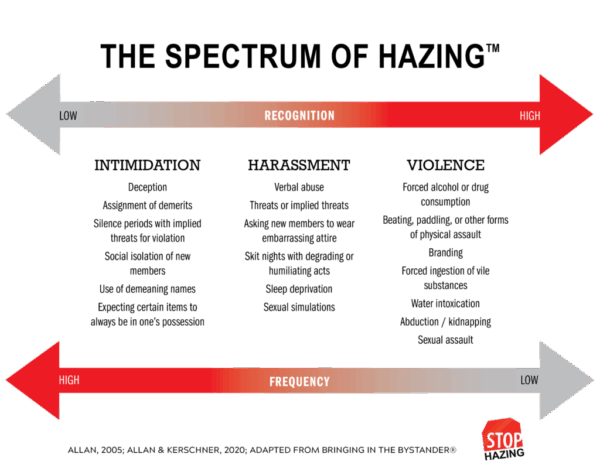Students and Employees should be aware that hazing is a criminal offence in both California and Oregon. Please refer to the WesternU’s Anti-Hazing Policy which includes information on California and Oregon’s laws on hazing.

Federal & State Hazing Acts
Clery Campus Safety Act Annual Security Report (ASR).
California AB-2193, titled “Hazing: educational institutions: prohibition and civil liability: reports and resources,” addresses hazing prevention and reporting in educational institutions. The bill requires certain institutions to report hazing incidents to the Legislature and the State Department of Education to develop an anti-hazing policy and resources for schools. It also establishes civil liability for educational institutions related to hazing practices.

Campus Hazing Reports
As of January 1, 2025, higher ed institutions are required to report crime statistics and disclose security related information by adding hazing incident and prevention program data to the Annual Security Report.
Beginning on December 23, 2025, higher ed institutions will post hazing incidents, if found to be true, to the Campus Hazing Transparency Report.

Report Hazing
WesternU provides multiple methods to report hazing concerns or allegations. Reports can be made to any of the following:
Tips for Reporting:
Reports made pursuant to this Policy do not supersede or replace other reporting obligations.
Q & A
There are various definitions of hazing depending on which law is being considered1. For purposes of this Policy, and in alignment with applicable law, WesternU has adopted the following definition of Hazing:
Hazing means: any intentional, knowing, or reckless act or method committed by a person(whether individually or in concert with other persons) against another person or persons including current, former, or prospective students, regardless of the willingness of such other person or persons to participate, that is committed in the course of a pre-initiation, an initiation into, an affiliation with, or the maintenance of membership in an official or unofficial student organization, club, or body that a) causes or creates a risk of physical or psychological injury, above the reasonable risk encountered in the course of participation in the institution of higher education or the organization or b) the initiator knows or should have known is likely to cause serious bodily injury to any former, current, or prospective student .
Hazing includes, but is not limited to, the following:
(a) whipping, beating, striking, electronic shocking, placing of a harmful substance on someone’s body, or similar activity;
(b) causing, coercing, or otherwise inducing sleep deprivation, exposure to the elements, confinement in a small space, extreme calisthenics, or other similar activity;
(c) causing, coercing, or otherwise inducing another person to consume food, liquid, alcohol, drugs, or other substances;
(d) causing, coercing, or otherwise inducing another person to perform sexual acts;
(e) any activity that places another person in reasonable fear of bodily harm through the use of threatening words or conduct;
(f) any activity against another person that includes a criminal violation of local, State, Tribal, or Federal law; and
(g) any activity that induces, causes, or requires another person to perform a duty or task that involves a criminal violation of local, State, Tribal, or Federal law.
Hazing is prohibited by WesternU, state and federal laws. For clarity, WesternU prohibits participation in Hazing, planning or organizing Hazing, soliciting or encouraging Hazing, aiding or abetting Hazing, and retaliating against those who report Hazing.
This Policy applies to conduct that occurs on or off campus and applies to all members of the University community, including faculty, staff, students, and student organizations in which two or more members are students enrolled in WesternU whether or not the organization is established or recognized by WesternU.
Any alleged violation of this Anti Hazing Policy shall be addressed under WesternU’s Sexual and Gender-Based Harassment, Interpersonal Violence, and Other Sexual Misconduct (SIM) Policy if the conduct alleged is sex or gender based and may be resolved through either the Title IX or Non-Title IX processes if the jurisdictional requirements are met.
The Spectrum of Hazing™ is a research-based resource developed by StopHazing researchers, Dr. Elizabeth Allan & Dr. Dave Kerschner. This current visual, developed from the research, outlines the three categories of hazing behavior (intimidation, harassment, and violence) and the inverse relationship between recognition and frequency of the behaviors. (Allan, E. J. & Kerschner, D. (2020). The Spectrum of Hazing™, StopHazing Consulting. https://stophazing.org/resources/spectrum)





